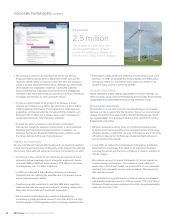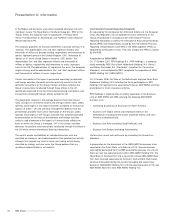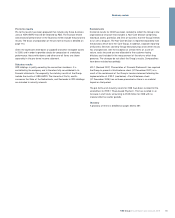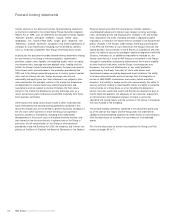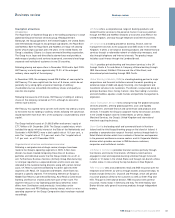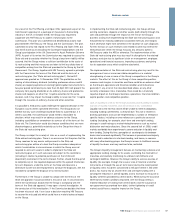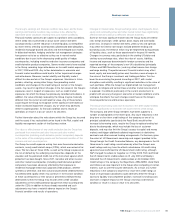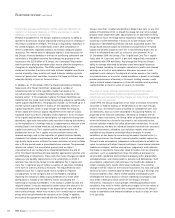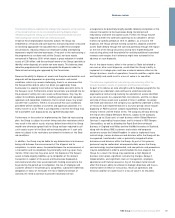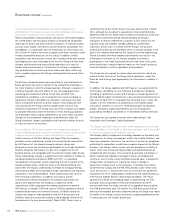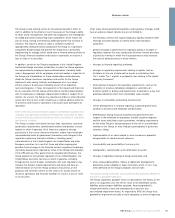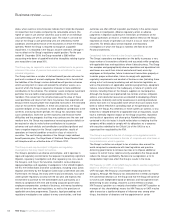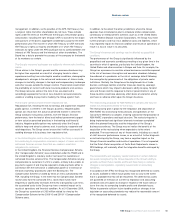RBS 2009 Annual Report Download - page 58
Download and view the complete annual report
Please find page 58 of the 2009 RBS annual report below. You can navigate through the pages in the report by either clicking on the pages listed below, or by using the keyword search tool below to find specific information within the annual report.RBS Group Annual Report and Accounts 200956
If the company was taken into temporary public ownership and a partial
transfer of its or any relevant entity’s business was effected, or if a
relevant entity were made subject to the SRR and a partial transfer of its
business to another entity was effected, the nature and mix of the
assets and liabilities not transferred may adversely affect the company’s
financial condition and increase the risk that the company may
eventually become subject to administration or insolvency proceedings
pursuant to the Banking Act.
While the main provisions of the Banking (Special Provisions) Act 2008
were in force, which conferred certain transfer powers on HM Treasury,
the UK Government took action under that Act in respect of a number
of UK financial institutions, including, in extreme circumstances, full and
part nationalisation. There have been concerns in the market in the past
year regarding the risks of such nationalisation in relation to the
company and other UK banks. If economic conditions in the United
Kingdom or globally were to deteriorate, or the events described in the
following risk factors occur to such an extent that they have a materially
adverse impact on the financial condition, perceived or actual credit
quality, results of operations or business of any of the relevant entities in
the Group, the UK Government may decide to take similar action in
relation to the company under the Banking Act. Given the extent of the
Bank of England and HM Treasury’s powers under the Banking Act, it is
difficult to predict what effect such actions might have on the Group and
any securities issued by the company or Group companies. However,
potential impacts may include full nationalisation of the company and
the total loss of value in securities issued by the company and the
inability of the company to perform its obligations under the securities.
If the stabilisation options were to be effected in respect of the
companies HM Treasury is required to make certain compensation
orders. The order HM Treasury is required to make will depend on the
stabilisation power adopted. For example in the event the Bank of
England were to transfer some of the business of a relevant entity to a
bridge bank, the Treasury would have to make a resolution fund order
and a third party compensation order including pursuant to the Banking
Act (Third Party Compensation Arrangements for Partial Property
Transfers) Regulations 2009. However, there can be no assurance that
compensation would be assessed to be payable or that holders of the
securities would recover any compensation promptly and/or equal to
any loss actually incurred.
The Group’s businesses, earnings and financial condition have been and
will continue to be affected by the global economy and instability in the
global financial markets.
The performance of the Group has been and will continue to be
influenced by the economic conditions of the countries in which it
operates, particularly the United Kingdom, the United States and other
countries throughout Europe and Asia. The outlook for the global
economy over the near to medium term remains challenging, particularly
in the United Kingdom, the United States and other European
economies. In addition, the global financial system has yet fully to
overcome the difficulties which first manifested themselves in August
2007 and financial markets conditions have not yet fully normalised.
These conditions led to severe dislocation of financial markets around
the world and unprecedented levels of illiquidity in 2008 and 2009,
resulting in the development of significant problems at a number of the
world’s largest corporate institutions operating across a wide range of
industry sectors, many of whom are the Group’s customers and
counterparties in the ordinary course of its business. In response to this
economic instability and illiquidity in the market, a number of
governments, including the UK Government, the governments of the
other EU member states and the US Government, have intervened in
order to inject liquidity and capital into the financial system, and, in
some cases, to prevent the failure of these institutions.
Despite such measures, the volatility and disruption of the capital and
credit markets have continued, and global economic conditions are
expected to remain challenging in the near to medium term, with many
forecasts predicting only modest levels of GDP growth over the course
of 2010. Similar conditions are likely to exist in a number of the Group’s
key markets, including those in the United States and Europe,
particularly Ireland. These conditions have exerted, and may continue to
exert, downward pressure on asset prices and on availability and cost
of credit for financial institutions, including the company, and will
continue to impact the credit quality of the Group’s customers and
counterparties. Such conditions, alone or in combination with regulatory
changes or actions of other market participants, may cause the Group
to incur losses or to experience further reductions in business activity,
increased funding costs and funding pressures, lower share prices,
decreased asset values, additional write-downs and impairment
charges and lower profitability.
In addition, the Group will continue to be exposed to the risk of loss if
major corporate borrowers or counterparty financial institutions fail or
are otherwise unable to meet their obligations. The Group currently
experiences certain business sector and country concentration risk,
primarily focused in the United Kingdom and the rest of Europe and
relating to personal and banking and financial institution exposures. The
Group’s performance may also be affected by future recovery rates on
assets and the historical assumptions underlying asset recovery rates,
which (as has already occurred in certain instances) may no longer be
accurate given the unprecedented market disruption and general
economic instability. The precise nature of all the risks and uncertainties
the Group faces as a result of current economic conditions cannot be
predicted and many of these risks are outside the control of the Group.
The Group was required to obtain State aid approval, for the aid given to
the Group by HM Treasury and for the Group’s State aid restructuring
plan, from the European Commission (the “Commission”). The Group is
subject to a variety of risks as a result of implementing the State aid
restructuring plan. The State aid restructuring plan includes a prohibition
on the making of discretionary dividend or coupon payments on existing
hybrid capital instruments (including preference shares and B shares) for
a two-year period commencing no later than 30 April 2010, which may
impair the Group’s ability to raise new Tier 1 capital through the issuance
of ordinary shares and other securities.
The Group was required to obtain State aid approval for the aid given to
the Group by HM Treasury as part of the First Placing and Open Offer,
the issuance of £25.5 billion of B shares to HM Treasury, a commitment
by HM Treasury to acquire up to an additional £8 billion of B shares if
certain conditions are met and the Group’s participation in the Asset
Protection Scheme (APS) (the “State aid”).
Business review continued


